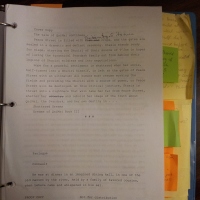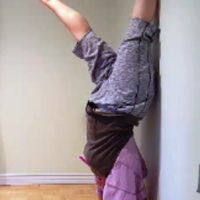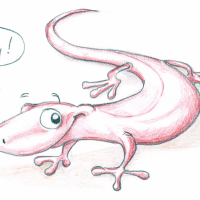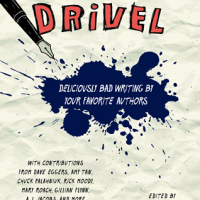When one of our own comes up with a story that involves six adults dressed like superheros wandering through San Francisco’s Tenderloin district (after they’ve lined up babysitters, that is), a ’70s blaxploitation film, adult adoption, and Venus Palermo (this is only chapter one, people!), there’s only two things to do: read the riotous piece and then fight about it, because that’s what we do. Welcome to the dogfight.
Here’s an excerpt of this whale of a tale by DWC co-founder Wes Pierce:
He had seen this movie too many times to count. Yet no matter how many times he watched it, the movie still always seemed to bring him the same warm, comfortable feeling. When he first popped the VHS tape into the machine, it made a funny grinding noise, perhaps because the tape was so heavily used; but soon the familiar sound of an ascending three-toned scale — accompanied by the logo of the production company behind the release of the film, a cartoon image of a white bird in flight over a dark mountain range — signaled the start of Black Mamba, starring one of the queens of 1970’s blaxploitation films, Venus Palermo, and almost instantly he could feel his breathing come easier and his heart-rate drop.
And here’s another excerpt, because we couldn’t pick which one we liked the best (read: which one would be the most fun to fight about):
‘Oh, well…such a lovely girl. She’s been back in town recently, you see, pregnant, and she needed our help. Her mother, poor thing, has been dead these many years. She was just a girl when it happened. Becka, I mean. And she’s been estranged from her father…oh, for ages. She had no one she could turn to. You should have seen her, poor thing…’
Gerda said, ‘Is this leading somewhere, Momma?’
‘Leading somewhere?’
‘Yes. Like, what you and Dad mean by sending me a birth announcement? Or, like, who this Rebecca person is…?’
‘Dear, I’m talking about Rebecca. Becka is Rebecca, dear. We’ve adopted Becka! You have a sister now, dear, just like you’ve said you’ve always wanted.’
‘You what? You adopted Rebecca…?’
‘You’re shouting, dear,’ her mother said. ‘There’s no need to shout.’
Are you a little confused about what these characters might do? So are we. That’s why we love wicked Wes’s story so much! Here’s what we thought, and feel free to join the fracas:
Jilanne’s Deeply Considered Insights
Wes, You know I love your voice, the way you kill us with your digressions/asides/humor etc., BUT sometimes I think you let it get in the way of the story. And that’s what I think you’ve done here. By the way, I love the conversation between Gerda and her mother. It speaks volumes. And I think you should let it speak without hand feeding us what we should be thinking. Neither Gerda nor the costume crew are working for me, YET. And I don’t know how you could make it work for me unless I have a chance to feel more for Gerda, Tracy and his raggedy group of caped crusaders. I think you may need to step back a little with the humor to win me over. Which leads me to the following:
Intention –
Why do you want this piece of writing to exist? Do you intend this to be a completely humorous piece, or do you want a balance between humor and pathos? Right now, most that’s coming through for me is humor.
Perhaps your intention is best demonstrated in the second paragraph, which I love. I can identify with this character who feels like her life is running her (or leaving her behind) and not the other way around.
Character –
Right now, I don’t feel like I’m under Gerda’s skin well enough to feel the import of the birth announcement. I feel like I’m on the outside looking in on all of these hapless characters. And I’m thinking that the humor is keeping me at a distance. It feels like the narrator is making fun of Gerda and the group of masked superheroes. Why should readers take any of these characters seriously if the narrator doesn’t? I vacillate on whether or not Tracy takes himself seriously. Gerda just seems unhappy and out of sorts until the announcement shows up. And the conversation between Gerda and her mother is so funny, I just want to laugh, not empathize with her predicament. Maybe if I felt more for Gerda before the conversation with her mother?
An example of a humorous instance I do like: “superstitious half —not that she is superstitious” aside.
A few well-placed bits of humor work to give the character depth. For me, too much humor cheapens the emotion.
Structure –
I like the use of alternating POV chapters. Nice way to introduce Tracy without having to explain his relationship to readers.
Foreshadowing –
Readers shouldn’t see foreshadowing on the first read through. It’s only after they’ve reached the end and look back that they should be able to identify where the foreshadowing takes place.
I think the foreshadowing is too heavy-handed in places, like the first paragraph. It also feels like you’re using this to give us Gerda’s age, professional credentials, and health midst a digression on free will vs. Eastern religion.
Awkward foreshadowing/time shift at end of chap. 2 on pg. 11. “a few weeks later….”
Tone –
right now, it’s one of humor.
Language –
watch diction, for example, when Random thinks “pulling shit”, “marshall the votes” and “arresting sight” in the same paragraph. Later Halo Shield uses the word “scrape.” I don’t think anyone in this milieu would use the word “scrape.” Seems very 50s Leave it to Beaver term. Especially if they’re using the term “head case” and “ape-shit” in the same paragraph.
Clarity –
although I like some of the digressions, there is a tendency to be a little too convoluted, drawing away from narrative line.
Consistency –
sometimes the narration seems inconsistent, for example, pg 10 first he’s feeling warm and comfortable when he starts the movie, his breath comes easier, his heart rate drops, then suddenly he can’t sit still and he starts boxing and flailing about.
Authenticity/believability –
Having walked through the Tenderloin quite a bit in my 18 years of living in this city, I’m not sure I buy the authenticity of the Tenderloin section. Maybe if it wasn’t so over the top funny. Maybe reading a little William T. Vollmann might help with the vibe. Better yet, wander around 6th and Market after 9pm. Eye-opening even after Twitter moved in.
I don’t believe that Gerda doesn’t know who the birth announcement is from, even if she’s drunk.
Show and tell –
Sometimes I think your balance of show vs. tell falls too much on the telling side.
Example – pg. 12 “Gerda was really feeling the alcohol from lunch; she only hoped to God her mother wouldn’t notice.” I’d rather see her convey this in action, not thought.
These are my thoughts for the moment. We’ll see what fine insights our discussion brings. God, you are one hilarious dude!
Cheers!
Jilanne
Laurel’s Equally Pondered Musings
Dear Wes,
This chapter made me laugh out loud. I love how one of the guiding principles, chaos, is delivered via the character’s name. For me, this piece is strongest when I know the least. That is, what works, especially in section two, is when we’re dropped into the middle of the action and don’t know exactly who the characters are or why they’re doing what they’re doing, but we absolutely want to come along for the ride. To take it in sections, here’s my thoughts on this first quartet:
One: In the opening section of this chapter, the character comes home from a party to find a card in the mail that causes her so much consternation she accidentally slices her finger with a pair of scissors. The end of the section then reveals the contents of the mysterious card. I might suggest closing on the idea of the character thinking there must be some mistake but save the actual revelation for later, so the reader will keep reading to find out what the card says. Compare this to the close of section two, which ends on a question—what happens when Random meets Venus Palermo?—that the reader totally wants answered. As endearing as this opening scene with Gerda is, I also think it’s setup for the main story rather than the story and that you might think about opening with section two, which is also zany enough to be a great hook.
Two: There’s a lot happening in this scene that I’m not sure I even follow. We have the character watching a 1970s blaxploitation film starring Venus Palermo, and he watches it on VHS. Now I get why one of the guys is called Chaos Theory, or I think I do. The point is that in this section, I really don’t yet know what in the heck is going on, and I love it! I want to keep reading so I can figure out what is happening in this zany world. But this great movie-watching scene with air karate is interrupted by the second phone call from Halo, and while the babysitter bit is hilarious, that interruption deflates the nice tension built so far (and also perhaps too quickly solves one of the problems introduced in the opening of the section). Perhaps just cut from the movie watching to the last cryptic paragraph, and then you could let us know in section four that the babysitter dilemma was solved.
There are a lot of names tossed out in the opening of section two: on the one hand, they’re entertaining as heck, on the other hand they’re hard to keep track of and also a mouthful. Perhaps shorten to use just the first names here, with the idea that the second part of the names will get revealed later? I think the writer has a little too much fun here with the names at the reader’s expense and it distracts slightly from the scene versus enhancing it. This scene operates because we’re half lost, so no need to be in a hurry to get us un-lost.
Three: The beleaguered Gerda gets a new baby sister who’s not a baby. This section made me laugh out loud. I’m absolutely certain that no one in the world can be as exasperating as one’s own mother, and this conversation between Gerda and her mother kills me. As above, reading this on the heels of Random’s debut scene makes me wonder if part one is needed and if we should simply meet Gerda right in the middle of this conversation with her mother, letting us glean via context what is going on. That is, letting the reader again be slightly disoriented and have to catch up en route might work in favor of the scene. It’s like walking up in the middle of a juicy conversation and not being able to stop from listening in, even when we don’t really know what the conversation is about. But we sure want to. I do wonder if instead of Gerda and her mother arguing about why Gerda doesn’t have kids, that Gerda should perhaps miss having that age-old argument that has unexpectedly been replaced by the self-satisfied attitude her mother now displays at having circumvented the grandchild “problem.”
Four: This section opens on back story, which is arguably useful, but I think we could glean much of it from context. I’m harping on the same point here, but I think you can just put the superhero squad on the streets of San Francisco and let us see them in action sans back story or explanation. That is, let the reader intuit from this one night how their nightly pursuits often turn out. The writer might comment a little too heavily on the characters in the opening of this section rather than letting the reader arrive at an opinion of the characters via living out a scene with them. It’s hilarious when, after saving the girl, we get this line: “Then the remaining members of the Society ran for it.” To me that line encapsulates beautifully who this group is. Instead of getting this rescue related in the past, perhaps let it become a present-moment scene, ending on that brilliant departure.
The setting of San Francisco is perfect for this story, and it’s fun to follow the band around Turk Street and elsewhere. Having been but an East Bay peasant, my knowledge of the Tenderloin isn’t exquisite, so I’ll let Jilanne and you debate how detailed to get there. You do show your knowledge of the city and its environs, and I think you could sketch in even more of the terrain to fully invite the reader into the scene. Everyone and everything could be a little more fully described as the scene unfolds.
The idea of the band of wannabe guardian angels is screamingly funny, and I can’t wait to follow them down a few more dark alleys. The reversal in the alley works great. A favorite moment of mine is when Halo’s glasses get knocked off by the flying nunchaks and then Chaos starts crying. That bit tells us as much or more as any back story. This tale is at its best when it moves without too much explaining. We’re looking at chapter one and getting pretty picky about it. My feeling is that as this story unfolds and we spend more time with this rag tag group and darling Gerda that we will grow to love them even more. Nice writing, as always. Thanks for a great read! I’m looking forward to the rest of the story.
Mad love,
Laurel Leigh
 P.S. Check out the awesome cover reveal for Dreams of a City of Ruin, book II in the Dreams of QaiMaj series by Dogpatcher Selah J Tay-Song. We can’t wait for the release!
P.S. Check out the awesome cover reveal for Dreams of a City of Ruin, book II in the Dreams of QaiMaj series by Dogpatcher Selah J Tay-Song. We can’t wait for the release!
And the totally cool image at the opening is by artist Reid Forster (a.k.a. clubraf). Check out his awesome website! http://clubraf.deviantart.com/




















As always I appreciate the group’s deeply considered insights.
After our discussion and your posted comments I am left with two major take-aways: my piece is funny, and (the age-old problem for most writers) I need to ‘show’ more and ‘tell’ less.
As for the first, I would just like to say I am not trying to be funny. It’s not that I don’t know when I’m being funny, I do; it’s just that sometimes I can’t imagine another, better way to write some of these scenes.
I don’t know why my stuff often seems to come out like this — that is, funny — but I would argue that what humor there is in these opening sections does serve a purpose, as the story I am about to tell gets pretty grim fast. Just a little taste of what’s ahead: murder, political rallies, serious jail time, white supremacists, free love, unrequited love, war, mental illness, child abandonment, possibly suicide.
That being said, I definitely have been put on alert to avoid those places where the writing seems ‘jokey,’ or where I seem to not be taking a character seriously (always a mistake in my opinion), only making fun of her to get a cheap laugh.
I just want to say right now, and for the record, I love all of my characters — even the sick-in-the-head ones. I don’t look down on any of my creations. I can’t imagine how anyone could spend as much time as a writer is expected to spend with his own characters, and not fall in love them. But as this is a work in progress, I am still trying to figure out how to dance that fine line between getting a reader to laugh with a character and not at her.
And as for the second point — again, as this is a work in progress, I think that I may be more than a little guilty of explaining the story and these characters as much to myself as to the reader. I am not yet as familiar with these characters or their situations as I might like, so I can see where I might be ‘telling’ too much and ‘showing’ too little.
Also, as this is the opening of a novel, not a short story, I can appreciate how it might be difficult for a reader to properly assess certain characters or scenes, as she is only seeing them through a small window and not getting to judge the piece as a whole.
Which is another way of saying that those characters or scenes that are not entirely clear or plausible will (hopefully) become clearer or more plausible as more is revealed about them in the story.
Fingers crossed.
And, finally, as always, thank you for your comments. You guys are the best! I couldn’t do it without you!
Well, I suppose the only thing we really fought about was whether Wes should get the story out first, stripping the narrative of humor until he goes back for a second round of revision. Laurel thinks he should just tone it down some. But I suppose Wes could write it all full tilt with the humor intact and then go back and strip out the places where it may tend to overwhelm distance readers, keeping them from fully experiencing the existential angst of these crazy characters. But if Wes can’t see where he’s being funny (or too funny), he’ll have to rely on beta readers to tell him when he’s going over the top.
So Wes, whatever you do, GET ON IT! Finish this sucker in the next six months! The ball’s in your court.
Thanks for the mention, Laurel! Great post!
Love your cover, Selah! Hope all is going well with you!